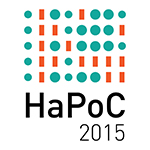All human activities take place over time, each with its own temporality which itself evolves over time. This paper is part of a historical reflection on the way that temporality is articulated in music and in computer technology, two domains whose temporal logics are initially very different. More specifically, this paper focuses on my specialism: the practices of composers of academic computer-assisted music. It concentrates on the temporal aspects of the act of composition. An initial phase, beginning around 1955, prolonged the reflections on composition of the period 1900-1950. The explosion of calculation speeds in the 1980s allowed “real time” to emerge , followed since the beginning of the 2000s by “live” composition time. This has brought computer time and musical time closer and closer together. The research currently being carried out in France, whether in computer science or in musical research bears witness to convergence and cross-fertilisation between the reflections on time proper to these two fields. The new types of music that are currently emerging subvert the “traditional” composition process. This movement is part of the general crisis affecting the futurist regime of historicity, and illustrates the growing influence of presentism.

 PDF version
PDF version
